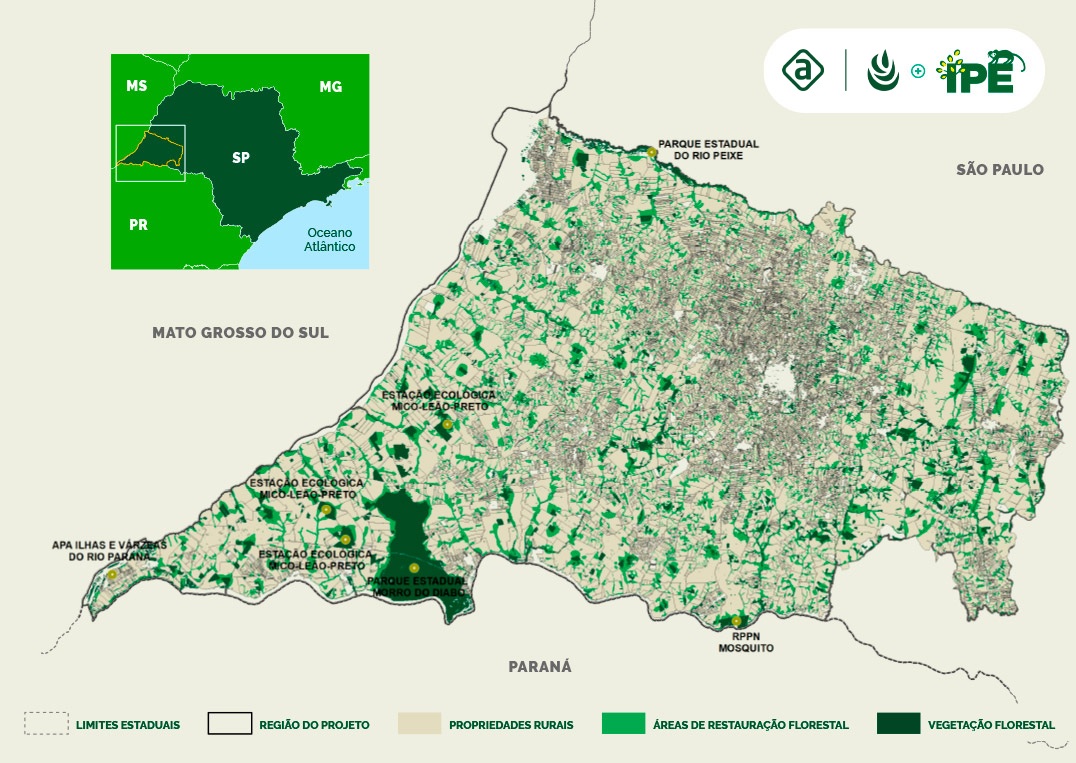START
November 18, 2021
SP
Pontal do Paranapanema
LOCAL PARTNERS
Creation of Ecological Corridors to Promote Connectivity Between Atlantic Forest Fragments.
The “Corridors for Life ARR Project” is a partnership between Ambipar Environment and IPÊ (Institute for Ecological Research) aiming to establish ecological corridors through the restoration of natural vegetation in the Atlantic Forest. This initiative seeks to connect the remaining forest fragments across 75,000 hectares of degraded areas in the Pontal do Paranapanema region, located in Western São Paulo. With the potential to sequester 29 million tons of CO2e over 50 years, the project will generate carbon credits certified under the Verified Carbon Standard (VCS).
In addition to delivering climate and biodiversity benefits, the project will provide significant advantages to local communities. These include environmental education programs, the development of training courses, job and income generation, and incentives for creating forest seedling nurseries. The seedlings produced will be purchased in large quantities for the project’s reforestation efforts. Aligned with VCS certification, this scope will also be verified under the Climate, Community & Biodiversity (CCB) standard.
The carbon credits generated through the removal of CO2e from the atmosphere by planting native trees will be sold in the voluntary market to offset our clients’ emissions.
Impact of the Corridors for Life ARR Project
in 30 years
annually
potentially benefited per year
MAP OF DREAMS
Location: Paranapanema Region in Western São Paulo.
Total Area: 17,504.53 km²
(30 municipalities)
Objective: The project aims to establish ecological corridors through the restoration of the natural vegetation of the Brazilian Atlantic Forest and promote connectivity between the remaining forest fragments.
Restoration Goal:
75,000 hectares by December 2041

Co-Benefits
The Corridors for Life ARR Project contributes to the United Nations Sustainable Development Goals (SDGs).
Through the acquisition of forest seedlings from community nurseries and the hiring of local small businesses for reforestation services, the project aims to generate up to 600 jobs annually for local communities. This strategy emphasizes gender equity and youth inclusion, ensuring at least 30% of jobs go to women.
The project promotes training focused on socio-economic areas such as entrepreneurship, administrative, financial, and environmental management, as well as best practices and innovation in forest restoration and seedling production, ensuring equitable access to qualifications. Additionally, it encourages scientific training and development through partnerships with research institutions.
The growing need for resources and labor to implement ecological restoration activities will drive the establishment of new enterprises and jobs through the expansion of community nurseries and the increase in forestry planting and maintenance companies, improving income, inclusion, and equity within the Project Zone. In parallel, qualification activities will support local communities in accessing professional opportunities. This initiative is expected to benefit approximately 600 people annually, including 180 women.
The project will foster, expand, and disseminate knowledge about the importance of forests and the opportunities created by restoration activities, encouraging critical thinking for a more sustainable society. This will ensure the conservation of fauna and flora species, including those threatened with extinction, as well as the protection of soil and water resources.
Restoration activities will promote an increase in native forest cover over 75,000 hectares, potentially removing 29 million tons of CO2 from the atmosphere through tree growth. The development of an advisory project that takes into account the needs of communities and other local stakeholders will also contribute to the success and sustainability of the areas in the restoration process.
The selection of restoration sites is based on landscape-level biodiversity conservation, aiming to create forest corridors to connect remaining fragments. This approach supports habitat creation for fauna, enhances gene flow, and contributes to the conservation of 8 endangered species, 3 of which are critically endangered. Additionally, the restoration efforts will protect soil and water resources.
Fill in the fields below to offset your company's emissions.
office
Av. Angelica, 2330
Ed. New England - 5th floor
Higienópolis, São Paulo - SP
PRESS
Send an email to: mkt.decarbon@ambipar.com
IPÊ OMBUDSMAN
The IPÊ Ombudsman is a direct channel for receiving requests for information and complaints from our internal and external public. This tool aims to address all raised issues with impartiality, transparency, and fairness.


